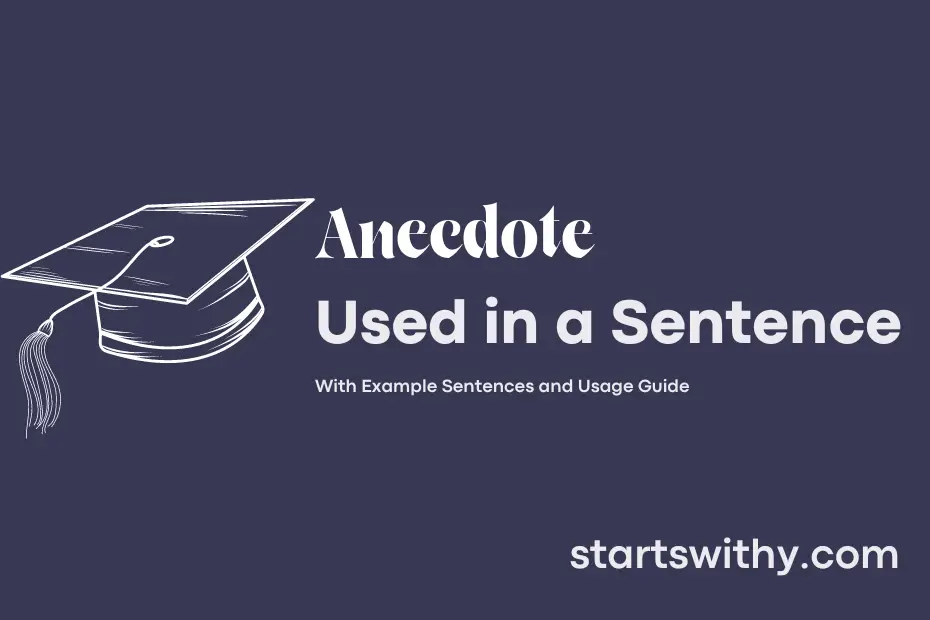Everyone loves a good story, and an anecdote is just that – a short, interesting narrative often used to make a point, illustrate a concept, or simply entertain. Anecdotes are like little glimpses into someone’s life or a situation, adding a personal touch to a conversation or piece of writing.
These brief tales can range from humorous to poignant, and are commonly used in speeches, presentations, and writings to help convey ideas in a relatable way. With their concise format and engaging nature, anecdotes are a powerful tool for connecting with an audience and driving home a message.
7 Examples Of Anecdote Used In a Sentence For Kids
- Anecdote is a short story about something interesting or funny.
- Do you want to hear an anecdote about a mischievous monkey?
- Grandma loves to tell us anecdotes from her childhood.
- Can you think of an anecdote to share with the class?
- I enjoy listening to anecdotes about animals.
- Let’s ask our parents for an anecdote from when they were children.
- The book is full of anecdotes about famous people.
14 Sentences with Anecdote Examples
- Anecdote: During a college presentation, my friend shared a hilarious anecdote about his first day on campus.
- Anecdote: Last semester, our professor started the class with an interesting anecdote about his own college days.
- Anecdote: One of the seniors shared an inspiring anecdote about overcoming failure during a career guidance session.
- Anecdote: While waiting for our exam results, my friend shared a nerve-wracking anecdote about a previous exam mishap.
- Anecdote: In a casual conversation with classmates, we exchanged funny anecdotes about college dorm experiences.
- Anecdote: During a cultural fest event, a student performed a captivating dance that depicted a meaningful anecdote.
- Anecdote: At a college workshop, the guest speaker shared a thought-provoking anecdote about her journey to success.
- Anecdote: While discussing study tips, a classmate shared an anecdote about a unique memorization technique that worked wonders for her.
- Anecdote: During a group project meeting, a team member shared a relatable anecdote about group work challenges.
- Anecdote: In a career counseling session, a former student shared an inspiring anecdote about landing a dream job.
- Anecdote: While preparing for exams, my friend shared a helpful anecdote about staying motivated during stressful times.
- Anecdote: During a college event, a guest speaker shared a thought-provoking anecdote about the importance of networking.
- Anecdote: While discussing time management tips, a classmate shared a personal anecdote about balancing studies with extracurricular activities.
- Anecdote: At a campus club meeting, a member shared a heartwarming anecdote about the impact of volunteering in the community.
How To Use Anecdote in Sentences?
An anecdote is a short story or a brief account of an interesting or amusing incident. When using anecdote in a sentence, it is important to remember a few key points.
First, always introduce the anecdote clearly by setting the context. For example, “Let me share an anecdote from my childhood.”
Second, provide details that paint a vivid picture for the audience. This helps to engage the listeners and make the anecdote more compelling. For instance, “During our family road trip, we had a hilarious anecdote involving a sneaky raccoon stealing our snacks.”
Third, ensure that the anecdote is relevant to the conversation or topic at hand. Avoid sharing anecdotes that may derail the discussion. For instance, “Although it was a funny anecdote, let’s stay focused on the main agenda of today’s meeting.”
Lastly, always wrap up the anecdote by connecting it back to the main point or moral of the story. This helps to reinforce the message you want to convey. For example, “In conclusion, the anecdote taught us the importance of being resourceful in unexpected situations.”
By following these guidelines, you can effectively incorporate anecdote into your conversations or writing. Remember that anecdotes are powerful tools for capturing attention, creating rapport, and delivering messages in a memorable way.
Conclusion
In this article, we explored several sentences incorporating anecdotes to illustrate a point or evoke a personal experience. Anecdotes are powerful storytelling devices that engage readers and make content more relatable. By weaving personal narratives into writing, authors can humanize their message and connect with audiences on a deeper level.
Whether used to entertain, persuade, or inform, anecdotes bring a personal touch to writing and help readers better understand complex ideas. Through the examples provided, we see how anecdotes add depth and authenticity to sentences, making them memorable and impactful. Overall, the use of anecdotes enriches writing by providing real-life contexts that resonate with readers and drive home the intended message.



